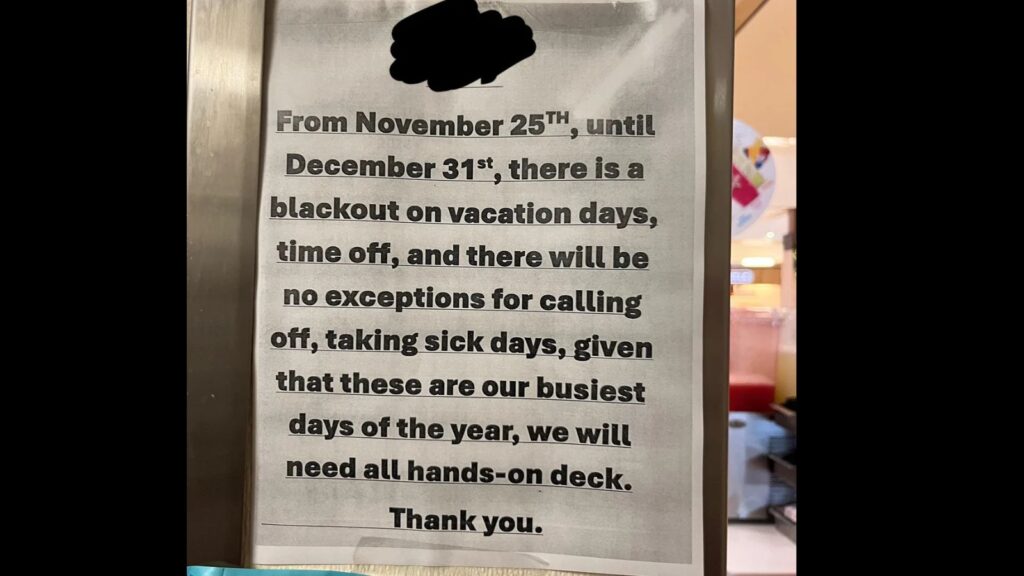“Company’s ‘No Time Off’ Policy Until Year-End Sparks Outrage Over Employee Well-Being”
A company’s recent decision to implement a “blackout period” on vacations and sick days from November 25 to December 31 has sparked widespread criticism across social media platforms. The policy, shared via a Reddit post, bans employees from taking time off during the company’s busiest season, which includes both vacation days and sick leave.


A company’s recent decision to implement a “blackout period” on vacations and sick days from November 25 to December 31 has sparked widespread criticism across social media platforms. The policy, shared via a Reddit post, bans employees from taking time off during the company’s busiest season, which includes both vacation days and sick leave.
The notice reads: “From November 25th until December 31st, there is a blackout on vacation days, time off, and there will be no exceptions for calling off, taking sick days. Given that these are our busiest days of the year, we will need all hands-on deck. Thank you.”
While the company’s aim is likely to maintain productivity during a peak period, the policy has stirred anger among workers and online users alike. One employee shared the notice, expressing frustration about the company’s apparent disregard for employee well-being, especially when it comes to health-related absences. The employee wrote: “Why does corporate think this is okay? God forbid I get sick. Company doesn’t give a s**t.”
Social Media Backlash and Concerns
The policy quickly gained attention on Reddit and Twitter, where users voiced strong opposition, questioning the ethics of forbidding employees from taking sick leave. Many argued that the policy was unreasonable, particularly given the potential risks of employees working while ill.
One social media user criticized the move, stating, “You know, in the civilized world we consider this illegal.” Another chimed in, writing, “If you die, you have to inform management 3 days prior.” Others shared their own negative experiences with strict leave policies, with some claiming that such rules contribute to employee burnout and dissatisfaction.
Ethical Debate on Work-Life Balance
While some defended the company’s right to enforce the leave blackout during a busy season, the majority of responses reflected frustration with policies that prioritize profits over people. One comment noted, “I know a guy who owns a company and they don’t let anyone off during the summer. The staff are overworked, underpaid, and the guy treats them like s**t. Then he complains that people keep quitting.”
The debate reflects broader concerns about work-life balance, with many arguing that companies should invest in employee welfare, especially during times of high pressure.
A Retail-Oriented Move?
Several commenters speculated that the policy was likely in place at a retail company. One user suggested, “This seems like it is probably retail. I love how this sign acts like they will fire you for being sick, except here’s the thing… they NEED you too. They need all hands on deck, remember? That portion of the note is a scare tactic. I’d make every effort to be there, sure. But if I had a fever or something, I’d still call in and roll the dice.”
While some workers may feel pressured to comply with such policies to avoid job jeopardy, others argue that no one should be forced to work when unwell, especially if they risk spreading illness to colleagues.
Company’s Response?
At the time of publication, the company had not yet commented on the backlash or clarified its stance on employees’ rights during this period.
As the discussion continues, the growing backlash against the policy reflects the broader conversation about balancing operational needs with the health, safety, and well-being of employees during high-stress periods. Many are calling for a reevaluation of such extreme measures, urging employers to consider more humane approaches to managing busy seasons.
Sources By Agencies








Kadıköy su kaçağı tespiti Bu kadar hassas tespit yapan bir firma daha önce görmemiştim. https://oolibuzz.com/ustaelektrikci
Mecidiyeköy su kaçak tespiti Sultanbeyli’deki evimizde su kaçağı vardı, çok kısa sürede çözüldü. Harika bir ekip. https://netgork.com/ustaelektrikci
great articlemonperatoto Terpercaya
great articlesitus toto Terpercaya